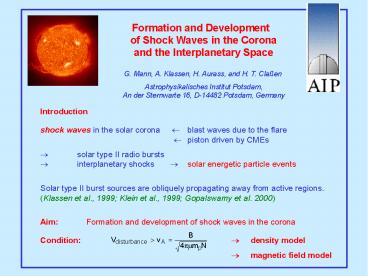Formation and Development - PowerPoint PPT Presentation
Title:
Formation and Development
Description:
of Shock Waves in the Corona. and the Interplanetary Space. shock waves in the solar corona blast waves due to the flare piston driven by CMEs ... – PowerPoint PPT presentation
Number of Views:111
Avg rating:3.0/5.0
Title: Formation and Development
1
Formation and Development of Shock Waves in the
Corona and the Interplanetary Space
G. Mann, A. Klassen, H. Aurass, and H. T.
Claßen Astrophysikalisches Institut Potsdam,
An der Sternwarte
16, D-14482 Potsdam, Germany
Introduction
shock waves in the solar corona ? blast waves
due to the flare ? piston driven by
CMEs ? solar type II radio bursts
? interplanetary shocks ? solar
energetic particle events
Solar type II burst sources are obliquely
propagating away from active regions. (Klassen et
al., 1999 Klein et al., 1999 Gopalswamy et al.
2000)
Aim Formation and development of shock waves
in the corona
Condition
? density model
? magnetic field model
2
Example solar event on November 18, 2000
? type II burst started at 130 MHz on
131142 UT ? shock associated type III's
after 131430 UT (Cane, 1981)
3
Density Model
- ? corona for
- one-fold Newkirk model
(Newkirk, 1961 Koutchmy, 1994)
-
-
with - (? barometric height formular with
)
? outer corona and interplanetary space for
density model by Mann et al. (2000)
? special solution of Parkers (1958)
wind equation
? agreement with observation up to 5 AU
4
Magnetic Field Model
? active region ? magnetic dipole
with
? quiet Sun with ? 4.8
nT at 1 AU ? EIT wave analysis
(Mann et al., 1999 Klassen et al., 2000)
5
The Alfven Speed
? direction of the magnetic fields (along
the axis of the dipole) ? parallel
() ? anti-parallel
(-)
? example ? 45º
minimum at 1.45 RS at 1.32 RS (cs 180
km/s !) maximum at 3.8 RS
6
Discussion
movement of a disturbance travelling obliquely
away from an active region with a velocity V (see
also Gopalswamy et al., 2001 Mann et al., 2003)
? shock formation
(Klassen et al., 2000) ? V ? 930 km/s
?
at the minimum of vA
? supercritical shock ? time delay in
energetic electron production (Krucker
Lin, 1999 Haggerty Roelof, 2001)
7
Results
? initial energy release (flare) and/of lift off
a CME ? shock formation ? type II
radio burst ? maximum of MA ?
production of energetic electrons ?
disappearance of type II bursts at 10 MHz ?
shock formation gt 6 RS ? production of
energetic ions ? solar energetic
particle events (Mann et al., AA, 2003)































